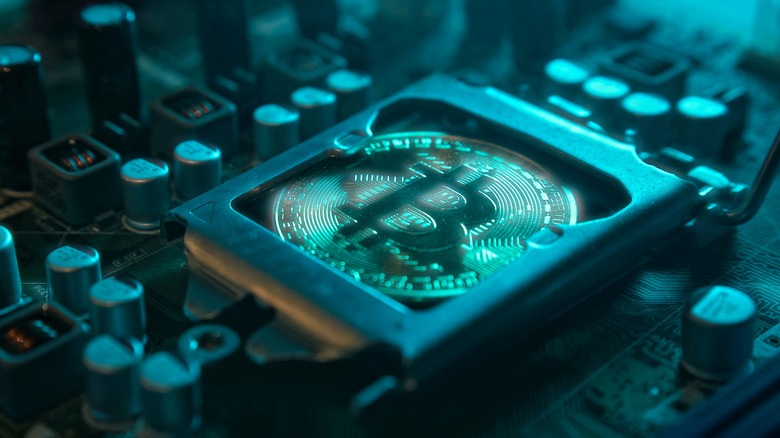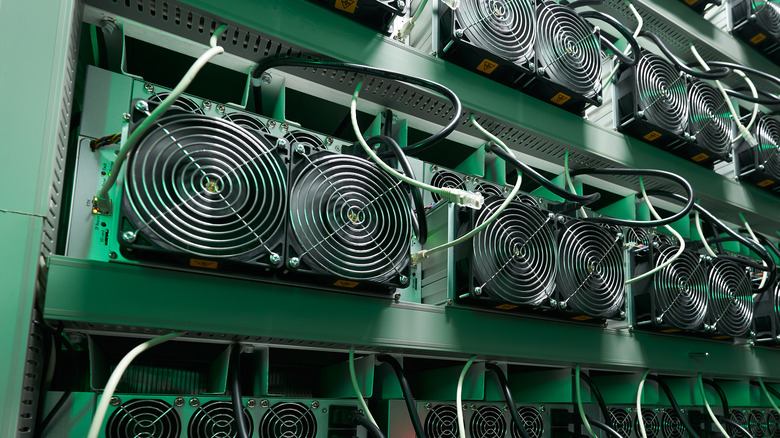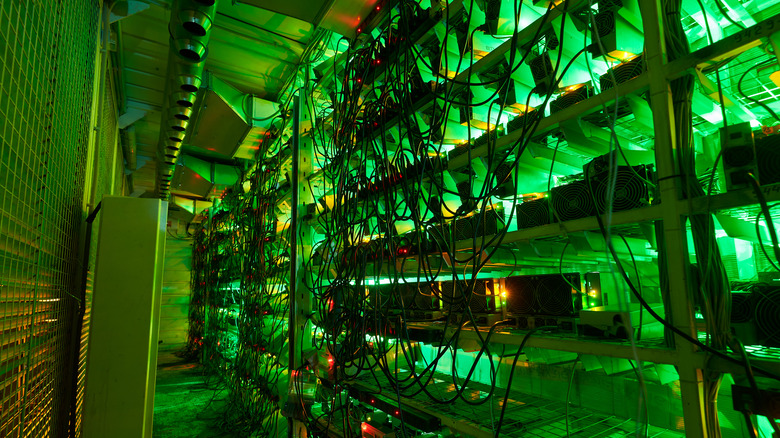This Is Everything You'll Need To Mine Bitcoin
Almost two centuries ago, what is now known as the U.S. West Coast was changed when several hundreds of thousands of people arrived in California for what came to be known as the Gold Rush. They were drawn by the promise of getting rich by prospecting for gold, but as time passed, the process of tracking down and finding the precious metal became more complex.
What started as panning (or filling a pan with gravel and water and shaking that down in a circular motion until gold was left at the bottom) gave way to more sophisticated mining operations that required advanced equipment designed to extract gold beneath the surface. One technique, known as "hydraulic mining," yielded as much as $170 million worth of the precious metal between 1860 and 1880, according to PBS.
There is little that sets that story apart from today's online search for Bitcoin. While the act of physical mining entices the earth to give up its stores of precious metals and stones, crypto "mining" (essentially an analogy) puts new Bitcoin into circulation. And like mining for gold, while you might have been able to generate returns with basic hardware and a little elbow grease just a few years ago, the search for crypto has evolved so that you'll need much, much more than the computing power you're currently likely to have at home.
A powerful bare-bones computer is a must for mining crypto
"Mining" crypto, doesn't call for you to wander around the internet in search of something that glitters. What it does involve is solving special, complicated puzzles that enable miners to first examine transactions, and then verify them, before adding this information to a string of information known as the blockchain.
While regular computers may have been enough in the past to help solve these crypto puzzles, that is no longer the case today; particularly since more people are competing for a finite amount of Bitcoin, and high-powered computers are needed to crack these puzzles more quickly. "The mining, or transaction processing, is accomplished by incredibly expensive and powerful computers whose sole function is to run algorithms to solve the mathematical problem that allows their owner to win a Bitcoin block — and the revenue that comes with it," Richard Baker, CEO of miner and blockchain services provider TAAL Distributed Information Technologies, explained to Forbes.
As such, the heart of any Bitcoin mining operation or "rig" is a strong, bare-bones computer, according to CNET; and currently, the preferred Bitcoin mining computer of miners today is an application-specific integrated circuit or ASIC unit, because it can run through as many as 100 trillion puzzle solutions per second (via Forbes). Further, one ASIC, which can set you back more than $10,000, isn't enough to do the trick, since the more computers you have, the higher the chances are of finding your Bitcoin.
You'll need a strong internet connection and more to mine Bitcoin
Because getting an expensive computer to ensure your crypto mining rig has enough computing power can be a huge investment, you'll likely want to recoup your losses pretty quickly. This will mean access to both the internet and a power source 24 hours a day, seven days a week, as well as the use of an efficient cooling system — which can be a fan or a medium-sized air conditioner — that will keep your mining rig from overheating; all of which translates into plenty of energy. For all this effort and if you're successful, you're likely to earn about 6.25 Bitcoins — or approximately $147,000 — for every successful transaction.
While the financial reward might make it tempting to mine for Bitcoin on your own, it may not be the wisest choice. The chance of finding Bitcoins increases with the amount of computing power a miner puts into the endeavor, which is why Bitcoin prospectors are more likely to pool their resources and work together in a mining pool. Another option is to go into cloud mining, which sees potential miners renting their rigs instead of buying their own.


